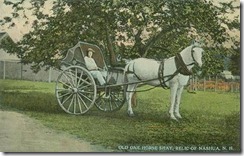Politics has been shifting along with the evolution in the economy. The problem is that most people’s mindset has still been stuck with archaic models and or of visions of the previous order.
Old One Horse Shay (Wikimedia)
Walter Russell Mead captures neatly this intuitive ‘resistance to change’.
Mr. Mead writes, (bold highlights mine)
Krugman and the Times editorial board are both examples of something important in American life today: left-liberal intellectuals are increasingly able to understand that individual supports of the blue social model are crumbling. But they are still so captivated by the blue model, so profoundly convinced that the Progressive movement’s solutions to America’s social ills in 1910 are still valid today, that they cannot yet look beyond the blue model to imagine a different and brighter future for the United States....
If, as Krugman posits, demand for US workers will be falling in both manufacturing and the professions, how exactly will labor unions get higher wages for their members? Factories will be closing in Krugman’s world and law firms will be turning more and more work over to computers or shipping it overseas. Perhaps stronger unions could make it harder for companies to do this for a while, but ultimately facts speak. Stronger unions making tougher wage demands will not exactly persuade American (and foreign) investors to create new jobs in this country — or to slow down their efforts to reduce their US workforce by outsourcing and automation. When human workers receive rising wages, become harder to fire, and are governed by ever more convoluted and expensive work rules, replacing them with computers becomes more attractive, not less.
Unions tend to flourish when demand for workers is rising (as in China today); they do not and cannot protect the situation of workers as a whole against a background of falling long-term demand for their work.
The problem isn’t that this or that piece of the blue social model is breaking down and needs to be fixed so that the rest of the model can go on working well. It’s not that the university system is broken and that if we fix that the model still works. Ditto the public sector unions or the situation of the labor movement as a whole. Mandating an expensive new set of health care entitlements at a time of looming insolvency won’t help either.
The problem with the blue social model today is systemic. It’s not a problem with one piece or another. The pieces are all falling down and breaking apart at once. It is what happened to the “One Hoss Shay” in Oliver Wendell Holmes’ poem about, they used to teach us back in Pundit High, the breakdown of Calvinist religion in New England.
Read the rest here.
Like the transition of the economic order from agriculture to industry, we are seeing also the same transition from industrial era to the information age. And since the economy drives politics, so will the political structures shift accordingly.
The important point is that these ‘political-economic’ transitions represent a discovery process. It will NOT happen overnight. It will come with painful episodes of trial and errors with many fine tuning along the way.
It will also come with the auto response mechanism known as “resistance to change” especially from entrenched parties that had long benefited from the old order. Walter Mead’s take down of left-liberal intellectuals go along this line of thought.
Labor unions can be compared to current government budget deficits modelled after Bismark’s welfare states. All have been based on the industrial age top-down concept.
And the same top-bottom dynamic goes along with information flows as seen through the previous mainstream media model. But the web has been providing intense competition such that the old force appears to be breaking down. And unlike governments and their apologists, who seem plagued by intellectual stasis, many in the media appear as trying to cope with the changes of the current trends.
While the welfare construct could be seen to have worked earlier, these economically unsustainable platforms have been giving way. In short, the politics of the industrial age may have reached its tipping point.
And as the revolutions in Greece or the MENA, or the standoff in Wisconsin manifests, they operate on a common denominator—the political economic structure of the industrial age has been crumbling.
Many will struggle to maintain the old order, and that’s why transitions are never smooth. But at the end of the day, we are likely to learn how to adjust to these new realities in spite of the conflicts. Alternatively, this extrapolates to "don't fight the trend".
And I close with Mr. Mead’s conclusion...
This is the essence of progress: as we move forward less of our society’s time and energy goes into just staying alive; more of it goes into living better. The key to that now is to move as quickly as possible to reshape these critical professions with the full power of information technology
Amen.

No comments:
Post a Comment